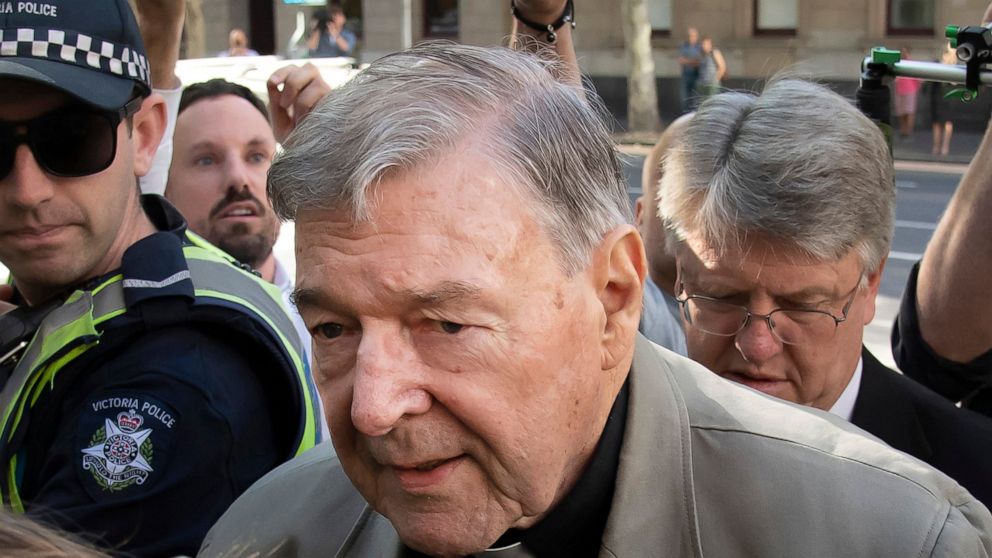Cardinal Pell returns to Vatican mired in financial scandal
Cardinal George Pell has returned to Rome after his acquittal on child sexual abuse charges to find the Vatican mired in a financial corruption scandal
ROME — Cardinal George Pell, who left the Vatican in 2017 to face child sexual abuse charges in Australia, returned to Rome on Wednesday to find a Holy See mired in the type of corruption scandal he worked to expose and clean up.
The 79-year-old Pell arrived at Rome’s Leonardo da Vinci airport on a flight from Sydney wearing a blue surgical mask. He waved briefly to reporters before getting into a waiting car without making any comments.
The trip is his first back to Rome after he took a leave of absence as Pope Francis’ finance czar in 2017 to face historic sexual abuse charges stemming from his time as the archbishop of Melbourne. After he was absolved by Australia’s High Court in April, Pell said he wanted to return to Rome to clean out his Vatican apartment, but intended to make Sydney his home.
It wasn’t immediately clear how long Pell would remain in the Vatican or what his agenda might involve. The Vatican didn’t immediately say if he would meet with Francis. The pope never turned on Pell throughout the Australian court proceedings, keeping his job vacant for two years so as to not prejudge the outcome.
Pell arrived the same day that European anti-money laundering evaluators began a periodic visit to the Vatican. They, too, found a mounting financial scandal in the tiny city-state that already has cost a half-dozen people their jobs, including one of the Holy See’s most powerful cardinals, Angelo Becciu.
Pell and Becciu had long clashed over the Australian’s efforts to bring greater transparency and accountability to the Vatican’s balance sheets.
The Council of Europe’s Moneyval team will be checking the Vatican’s compliance with international norms to fight money laundering and terror financing.
The Vatican submitted to the Moneyval evaluation process after it signed onto the 2009 EU Monetary Convention and in a bid to shed its image as a financially shady offshore tax haven whose bank has long been embroiled in scandal.
Moneyval has faulted Vatican prosecutors in the past for failing to prosecute many cases despite receiving dozens of suspicious transaction reports from the Vatican’s financial watchdog.
Vatican prosecutors did last year open a corruption investigation into the Holy See’s investment in a London real estate venture, but to date no one has been indicted.
The Vatican’s secretariat of state has sunk more than 350 million euros (nearly $400 million) into the London venture, much of it donations from the faithful. Tens of millions were paid in fees to Italian businessmen who acted as middlemen in the real estate deal.
Last week, Pope Francis fired Becciu, the cardinal who helped orchestrate the original deal. Becciu was the “substitute,” or No. 2 in the Vatican secretariat of state from 2011 to 2018, when Francis made him a cardinal and named him prefect of the Vatican’s saint-making office.
Becciu has defended the London investment as sound and has denied any wrongdoing in it. He says Francis actually cited an unrelated issue in firing him: allegations that he used 100,000 euros ($117,000) in Holy See money to make a donation to a charity controlled by his brother.
Becciu and his family have denied wrongdoing.
Pell’s brusque style and aggressive clean-up effort ruffled many feathers within the Vatican old guard, Becciu’s especially. The Australian congratulated Francis after Becciu was sacked.
“I hope the cleaning of the stables continues in both the Vatican and Victoria,” Pell said in a statement last week, referring to his home state of Victoria, where he was initially convicted.
Pell served 13 months in prison before Australia’s High Court acquitted him in April of molesting two choir boys in the late 1990s when he was archbishop of Melbourne.
In his first television interview after his release, Pell linked his fight against Vatican corruption with his prosecution in Australia.
———
AP visual journalist Luigi Navarro contributed.
![]()


